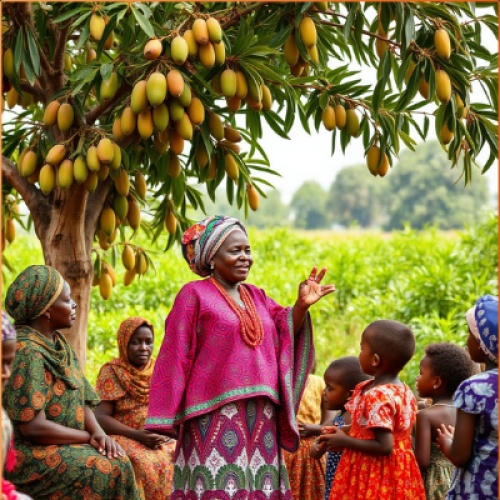In a small, troubled village called Umudim, nestled between rocky hills and a winding river, conflict had become a way of life. For years, disputes over land, leadership, and old grudges had torn neighbors apart. The market square echoed more with arguments than laughter. But all that began to change because of one woman - Adaora Ezenwanyi.
Adaora was no warrior, no queen, and no politician. She was a teacher, a widow, and a mother of three. But what she had was something far more powerful - wisdom, compassion, and unshakable courage.
She began with the children.
Every evening under the ancient iroko tree, Adaora gathered children from both sides of the feud - children of farmers and herders, children of the old chiefs and the new rebels. She told them stories. Not just any stories - stories of unity, forgiveness, and greatness that could only be achieved together.
Then, she moved to the women.
She formed a circle called "Umu Nwany? Maka Udo" - Women for Peace. They began meeting weekly, cooking together, cleaning the village square, and visiting sick elders - regardless of whose "side" they were on. Soon, the sight of enemies laughing over soup became normal.
But peace is never welcomed by everyone.
One night, angry young men from both factions plotted to burn down Adaora's home. Word spread quickly, and by dawn, dozens of children and women had formed a human shield around her house, daring anyone to harm her.
The message was clear: Adaora had become the voice of the people.
Seeing this, the village council - once paralyzed by pride - invited her to speak. In front of a gathering crowd, Adaora said:
"Peace is not the absence of anger, but the courage to listen. If we don't teach our children to forgive, they will inherit our hatred. I don't have riches or titles, but I have a dream - of a village where no child runs from gunfire, and no woman buries her son because of a meaningless fight."
The silence that followed was heavy, then came applause - slow, then thunderous.
Within months, mediation meetings were held under Adaora's guidance. Lands were reallocated fairly, community festivals returned, and even rival youth groups began working on joint farming projects.
Adaora never asked for recognition. But one year later, the governor visited Umudim, declaring it a model community for peacebuilding. And in front of cameras and microphones, he pinned a medal on Adaora and said:
"This is the woman who stilled the storm."
But Adaora, smiling humbly, only replied:
"The storm was in our hearts. All I did was light a candle."
And in Umudim, that candle still burns.
Adaora was no warrior, no queen, and no politician. She was a teacher, a widow, and a mother of three. But what she had was something far more powerful - wisdom, compassion, and unshakable courage.
She began with the children.
Every evening under the ancient iroko tree, Adaora gathered children from both sides of the feud - children of farmers and herders, children of the old chiefs and the new rebels. She told them stories. Not just any stories - stories of unity, forgiveness, and greatness that could only be achieved together.
Then, she moved to the women.
She formed a circle called "Umu Nwany? Maka Udo" - Women for Peace. They began meeting weekly, cooking together, cleaning the village square, and visiting sick elders - regardless of whose "side" they were on. Soon, the sight of enemies laughing over soup became normal.
But peace is never welcomed by everyone.
One night, angry young men from both factions plotted to burn down Adaora's home. Word spread quickly, and by dawn, dozens of children and women had formed a human shield around her house, daring anyone to harm her.
The message was clear: Adaora had become the voice of the people.
Seeing this, the village council - once paralyzed by pride - invited her to speak. In front of a gathering crowd, Adaora said:
"Peace is not the absence of anger, but the courage to listen. If we don't teach our children to forgive, they will inherit our hatred. I don't have riches or titles, but I have a dream - of a village where no child runs from gunfire, and no woman buries her son because of a meaningless fight."
The silence that followed was heavy, then came applause - slow, then thunderous.
Within months, mediation meetings were held under Adaora's guidance. Lands were reallocated fairly, community festivals returned, and even rival youth groups began working on joint farming projects.
Adaora never asked for recognition. But one year later, the governor visited Umudim, declaring it a model community for peacebuilding. And in front of cameras and microphones, he pinned a medal on Adaora and said:
"This is the woman who stilled the storm."
But Adaora, smiling humbly, only replied:
"The storm was in our hearts. All I did was light a candle."
And in Umudim, that candle still burns.






